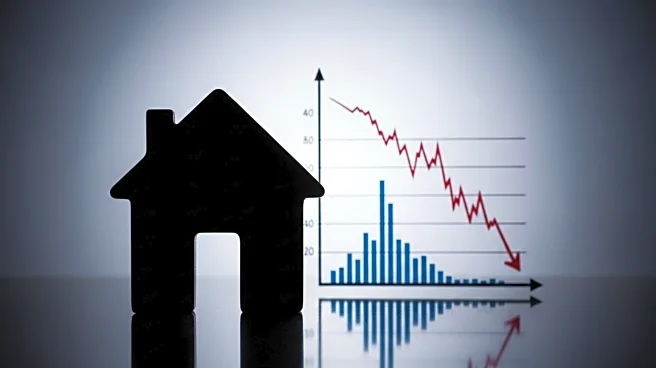What is the story about?
What's Happening?
Real estate analyst Nick Gerli has warned that the U.S. housing market is entering a 'deflationary vortex,' characterized by slowing home price growth and declining rents. Home prices have flattened year-over-year, with declines in nearly half of U.S. states. Rent growth has slowed to its lowest level in 14 years, indicating inventory accumulation across the housing market. The slowdown is attributed to affordability issues, high borrowing costs, and rising insurance premiums, leading to increased inventory and more negotiating power for buyers. Despite these challenges, the median sale price of homes continues to rise, albeit at a slower pace. The rental market is also experiencing a downturn, with declining rents in several markets, particularly those that saw a boom during the pandemic.
Why It's Important?
The deflationary pressures in the housing market have significant implications for homebuyers, renters, and investors. The slowdown in home price growth and rent increases may improve affordability for some, but it also signals potential economic challenges. High debt-to-income ratios are affecting homebuyer demand, while lower population growth and economic weakness are impacting rental demand. Investors facing affordability issues may seek to offload properties, further influencing market dynamics. These trends could lead to broader economic impacts, affecting consumer spending and real estate investment strategies.
What's Next?
The housing market may continue to experience price corrections, particularly in areas with surplus inventory. Stakeholders will monitor economic indicators, population growth, and immigration trends to assess future demand. Policymakers may consider measures to address affordability and support market stability. Investors and developers will need to adapt to changing market conditions, potentially focusing on regions with ongoing demand growth. The rental market may see further adjustments as new stock enters the market, influencing tenant affordability and choices.
Beyond the Headlines
The housing market's deflationary trends raise ethical and social considerations, particularly regarding housing affordability and access. The disparity between regions experiencing price declines and those with ongoing growth highlights broader economic inequalities. Long-term shifts in population dynamics and economic conditions may influence housing policies and urban development strategies. The evolving market landscape may also impact cultural perceptions of homeownership and renting, shaping future housing preferences.
















